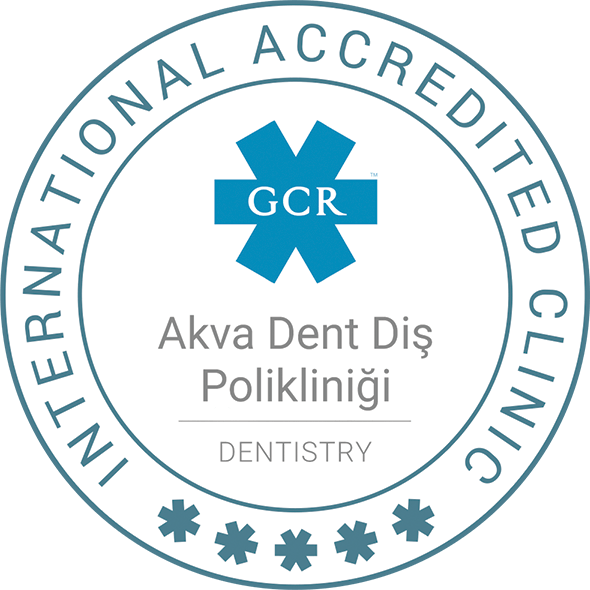Frequently Asked
Questions
The questions and answers in this section aim to help our patients focus on their treatment by preventing questions they may encounter about the treatment process.
In the case of a sore tooth, you can first try home remedies, such as applying cold to the sore area of the tooth or using a soothing mouthwash around the tooth. However, if the pain persists, you should contact your dentist and make an appointment. Your dentist can determine the cause of the pain and recommend the appropriate treatment.
The completion time of the teeth whitening process may vary depending on the method used and how much you want to whiten your teeth. Some whitening methods can be completed in one session, while others may require several sessions. Permanence depends on the whitening method and the person’s oral hygiene. Generally, teeth whitening lasts for a year or more.
An implant is a type of artificial tooth root that replaces lost teeth. It is usually in the form of a screw made of titanium and is inserted into the jawbone and fixed in the mouth in a similar way to other teeth. Implants are used to create a new tooth to replace a lost tooth, as well as to prevent oral and dental health problems caused by missing teeth. Implants can also be used to fix removable dentures. Implants require a surgical procedure, and the healing process after implant placement is also important. During this process, the implant fuses to the jawbone, and this process can often take several months. Although the success rate of implants is quite high, in some cases, there may be problems such as the implant not fusing with the jawbone sufficiently or infection may develop.
Implants usually consist of three main components:
- The Implant Body: This is the main component of the implant and is mostly made of titanium. The implant body is inserted into the jawbone and fuses with the bone, creating a strong bond.
- Abutment: It is a part that attaches to the implant body and provides an attachment point for other dental treatments (bridge, denture, etc.). The abutment is usually made of titanium, steel, or ceramic.
- Restoration: A tooth or tooth-like prosthesis that is placed over the implant. The restoration can be designed in a similar shape and color to the natural tooth and is usually made of porcelain or ceramic. However, it can differ between implant systems, and some implants may have more components as well as other components. For example, some implant systems may include a connector where the implant body and abutment meet or offer additional components that can be used for various purposes.
Implant treatment usually takes 3-6 months, including the placement of the implant and the healing process for the implant to fuse with the bone. The success rate is usually high and can range from 90% to 95%. However, it is advisable to discuss with your dentist to determine if you are a suitable candidate for implant treatment and what your success rate might be.
Bone grafts are used in implant treatment when there is insufficient bone tissue for the procedure. This can be the case for patients who do not have a suitable bone structure. Bone grafts can be taken from the patient’s own jawbone or hip bone, or synthetic bone grafts or bone grafts of animal origin can be used. The graft material is placed in the area of bone loss and helps the bone to grow back, allowing the implant procedure to be performed after the bone graft has been placed. The healing process usually takes 4-6 months for the bone graft to grow.
General anesthesia is a risky procedure that is usually not necessary for oral surgery, although it may be an option for patients who have a fear of needles. Before administering general anesthesia, an assessment should be made by the dentist, anesthesiologist, and the patient’s overall health condition. There are alternative options available for patients who are afraid of needles, such as local anesthesia or sedation. Local anesthesia numbs the area where it is administered to reduce pain, while sedation medication is used to help the patient relax.
Root canal treatment involves removing and cleaning the infected or damaged nerves and tissues inside a tooth. The duration of the procedure may vary depending on the degree of damage to the tooth and the severity of the infection. Generally, root canal treatment can be completed in one or two sessions.
The most important aspect of maintaining good oral hygiene is regularly brushing and flossing your teeth. You should brush your teeth at least twice a day for at least two minutes and make sure to clean the area between your teeth and gums. It is also important to use a soft-bristled toothbrush and replace it every three to four months. Additionally, regular dental check-ups and cleanings are crucial for maintaining good oral health.
There are various options for straightening teeth, including traditional metal braces, clear braces, lingual braces, clear aligners, and palatal appliances. The choice of treatment method depends on the severity of the problem, your personal preferences, and your orthodontist’s recommendation. The duration of the treatment varies based on the method used and the complexity of the issue, ranging from several months to a few years.
The decision between a filling and a crown depends on the extent of tooth damage or decay. Fillings are typically made of materials like composite resin, porcelain, or amalgam, while crowns are often made of materials like porcelain or zirconium. Your dentist will recommend the most appropriate option for your situation.
Gum recession occurs when the gum pulls away from the tooth’s surface, which can have multiple causes such as gum disease, improper brushing technique, trauma, hormonal changes, and genetic factors. Treatment options include gum grafting, gum transplantation, root planing, tooth extraction, or dental implants, which depend on the underlying cause of the gum recession.
Tooth sensitivity can result from tooth wear, decay, gum disease, gum recession, clenching, or grinding. Symptoms may include sensitivity to hot, cold, sweet, sour, or pressurized foods and drinks. Treatment options may include dental fillings, dental crowns, gum treatment, the use of a night guard for clenching or grinding, or the use of oral care products designed for sensitivity. If you experience tooth sensitivity, it is best to consult your dentist for appropriate treatment methods.
Recommended Clinic
Services
Live With Us
Smile
Hello, if you want to get information about our treatment options, please contact us immediately. Let us set up your free examination appointment.
No:1D Skyport Gülyapı Binası
Beylikdüzü / İSTANBUL
+90 544 620 10 20



